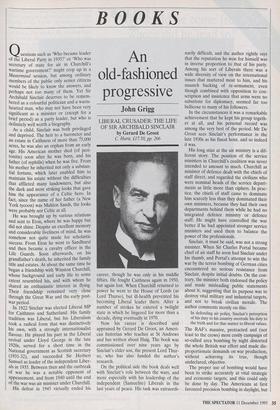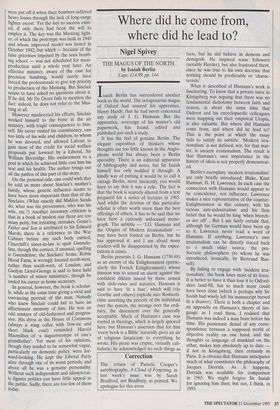BOOKS
An old-fashioned progressive
John Grigg
LIBERAL CRUSADER: THE LIFE OF SIR ARCHIBALD SINCLAIR by Gerard De Groot C. Hurst, £17.50, pp. 266 uestions such as 'Who became leader of the Liberal Party in 1935?' or 'Who was secretary of state for air in Churchill's wartime government?' might crop up in a Mastermind session, but among ordinary members of the public only senior citizens would be likely to know the answers, and perhaps not too many of them. Yet Sir Archibald Sinclair deserves to be remem- bered as a colourful politician and a warm- hearted man, who may not have been very significant as a minister or (except for a brief period) as a party leader, but who is definitely well worth a biography.
As a child, Sinclair was both privileged and deprived. The heir to a baronetcy and an estate in Caithness of more than 75,000 acres, he was also an orphan from an early age. His American mother died (of peri- tonitis) soon after he was born, and his father (of syphilis) when he was five. From his mother he inherited not only a substan- tial fortune, which later enabled him to maintain his estate without the difficulties that afflicted many landowners, but also the dark and most striking looks that gave him the appearance of a Celtic hero. In fact, since the name of her father (a New York tycoon) was Mahlon Sands, the looks were probably not Celtic at all. He was brought up by various relations and sent to Eton, where he was happy but did not shine. Despite an excellent memory and considerable liveliness of mind, he was somehow not quite made for scholastic success. From Eton he went to Sandhurst and then became a cavalry officer in the Life Guards. Soon afterwards, on his grandfather's death, he inherited the family title and estates. At about the same time he began a friendship with Winston Churchill, whose background and early life to some extent resembled his, and with whom he shared an enthusiastic interest in flying. Their friendship remained very close through the Great War and the early post- war period. In 1922 Sinclair was elected Liberal MP for Caithness and Sutherland. His family tradition was Liberal, but his Liberalism took a radical form that was distinctively his own, with a strongly internationalist flavour. He played his part in the Liberal revival under Lloyd George in the late 1920s, served for a short time in the National government as Scottish secretary (1931-32), and succeeded Sir Herbert Samuel as leader of the independent Liber- als in 1935. Between then and the outbreak of war he was a notable opponent of appeasement, and from 1940 until the end of the war was air minister under Churchill.
His defeat in 1945 virtually ended his career, though he was only in his middle fifties. He fought Caithness again in 1950, but again lost. When Churchill returned to power he went to the House of Lords (as Lord Thurso), but ill-health prevented his becoming Liberal leader there. After a number of strokes he entered a twilight state in which he lingered for more than a decade, dying eventually in 1970.
Now his career is described and appraised by Gerard De Groot, an Ameri- can historian who teaches at St Andrews and has written about Haig. The book was commissioned over nine years ago by Sinclair's elder son, the present Lord Thur- so, who has also funded the author's research.
On the political side the book deals well with Sinclair's role between the wars, and more especially with his leadership of the independent (Samuelite) Liberals in the last years of peace. His task was extraordi- narily difficult, and the author rightly says that the reputation he won for himself was in inverse proportion to that of his party. Among his sort of Liberals there was a wide diversity of view on the international issues that mattered most to him, and his staunch backing of re-armament, even though combined with opposition to con- scription and insistence that arms were no substitute for diplomacy, seemed far too bellicose to many of his followers.
In the circumstances it was a remarkable achievement that he kept his group togeth- er at all, and his personal record was among the very best of the period. Mr De Groot sees Sinclair's performance in the late 1930s as his finest hour, and so indeed it was.
His long stint at the air ministry is a dif- ferent story. The position of the service ministers in Churchill's coalition was never intended to amount to much. Churchill as minister of defence dealt with the chiefs of staff direct, and regarded the civilians who were nominal heads of the service depart- ments as little more than ciphers. In prac- tice, the chiefs of staff came to dominate him scarcely less than they dominated their own ministers, because they had their own departments behind them while he had no integrated defence ministry or defence staff. He might have controlled the war better if he had appointed stronger service ministers and used them to balance the power of the professionals.
Sinclair, it must be said, was not a strong minister. When Sir Charles Portal became chief of air staff he soon had Sinclair under his thumb, and Portal's attempt to win the war by the terror bombing of German cities encountered no serious resistance from Sinclair, despite initial doubts. On the con- trary, the minister both endorsed the policy and made misleading public statements about it, suggesting that its purpose was to destroy vital military and industrial targets, and not to break civilian morale. The author comments sternly on this:
In defending air policy, Sinclair's perception of his duty to his country overrode his duty to
the truth and for that matter to liberal values. The RAF's massive, protracted and (not least to the crews) most costly campaign of so-called area bombing by night distorted the whole British war effort and made dis- proportionate demands on war production, without achieving its true, though undeclared, objective.
The proper use of bombing would have been to strike accurately at vital strategic and economic targets, and this could only be done by day. The Americans at first favoured precision bombing in daylight, but were put off it when their bombers suffered heavy losses through the lack of long-range fighter escort. Yet the key to success exist- ed, if only there had been the will to employ it. The key was the Mustang fight- er, of which the prototype was built in 1940 and whose improved model was tested in October 1942, but which — because of the false priorities imposed by the area bomb- ing school — was not scheduled for mass- production until a whole year later. An effective minister, aware of the case for precision bombing, would surely have forced the professionals to give top priority to production of the Mustang. But Sinclair seems to have asked no questions about it. If he did, Mr De Groot fails to mention the fact; indeed, he does not refer to the Mus- tang at all.
However misdirected his efforts, Sinclair worked himself to the bone at the air ministry, with tragic consequences to him- self. He never visited his constituency, saw too little of his wife and children, to whom he was devoted, and allowed Labour to gain most of the credit for social welfare Proposals put forward by a Liberal, Sir William Beveridge. His enslavement to a post in which he achieved little cost him his seat and his health. The author brings out all the pathos of this part of the story. On the personal side, one could wish that he told us more about Sinclair's mother's family, whose genetic influence seems to have been more important than that of the Sinclairs. (What exactly did Mahlon Sands do, what was his provenance, who was his wife, etc.?) Another necessary criticism is that in a book of modest size there are too many petty, but irritating, mistakes. Gosse's Father and Son is attributed to Sir Edward Marsh; there is a reference to the War Cabinet before any such body existed; Churchill's sister-in-law is spelt Gwendo- line, though the correct, if unusual, spelling is Gwendeline; the Sinelairs' home, Robin Flood Farm, is wrongly located north-west, rather than south-west, of London; and Ciwilym Lloyd-George is said to have held `a number of minor ministries', though he ended his career as home secretary.
In general, however, the book is scholar- ly, while at the same time giving a vivid and Convincing portrait of the man. Nobody who knew Sinclair could fail to have an affectionate memory of him. He was an odd mixture of old-fashioned and progres- sive. His dress in the House of Commons (always a wing collar with bow-tie and short black coat) reminded Harold Macmillan of 'a daguerreotype of one's grandfather'. Yet most of his opinions, though they tended to be somewhat vague, particularly on domestic policy, were for- ward-looking. He kept the Liberal Party alive through one of its worst periods, and above all he was a genuine personality. Without such independent and idiosyncrat- ic figures politics can have little appeal to the public. Sadly, there are too few of them today.



































































 Previous page
Previous page